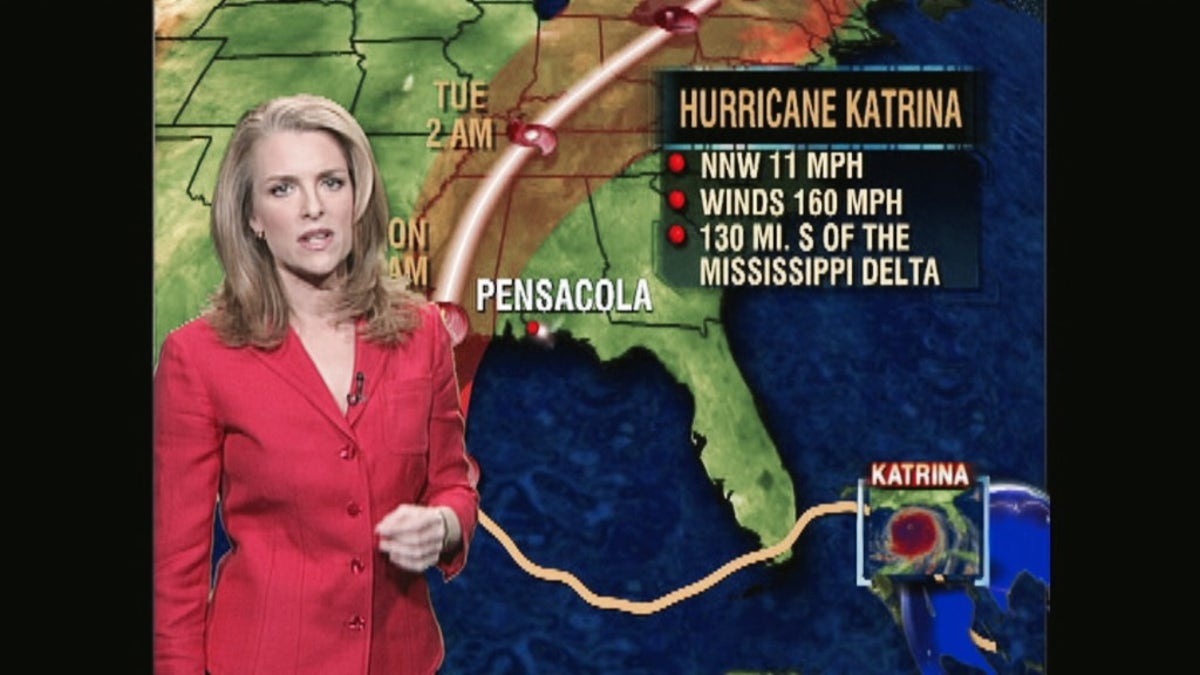
FNC
People ask me what’s the biggest weather event I’ve forecasted or witnessed as a meteorologist at Fox, and I never hesitate in my response:
Katrina.
That was 10 years ago this week, in the most active Atlantic Basin hurricane season in recorded history. There were 15 hurricanes in 2005, seven of which became major hurricanes (category 3 or higher). Katrina, the 11th named storm and the fifth hurricane of the season, killed over 1,800 people and left hundreds of thousands homeless.
When I go back to the 24 hours before the storm hit, I remember saying on air, “This is the worst storm to hit the worst possible location.” It became a monster category 5 overnight as it churned in the Gulf of Mexico.
There was a sense of dread that day, knowing this storm would be one for the history books and there was nothing anyone could do to stop it.
We all had done our research about New Orleans, which has an average elevation of 6 feet below sea level and is surrounded by water. A system of levees and seawalls was built to keep the city from flooding.
I saw many articles where officials said they worried that the levees might not hold if a major hurricane crashed onshore. Many of the city’s poorest and most vulnerable residents lived in neighborhoods below sea level.
We saw the images of people heading to the Superdome, which was called the "refuge of last resort” for those who were unable to get out of the city.
I remember getting choked up on air thinking about the thousands of people who didn’t leave the area because it was too late or they just couldn’t find the means to get out. I also remember a fellow meteorologist sending me the now famous “doomsday statement” written by National Weather Service meteorologist Robert Ricks:
HURRICANE KATRINA…A MOST POWERFUL HURRICANE WITH UNPRECEDENTED STRENGTH…RIVALING THE INTENSITY OF HURRICANE CAMILLE OF 1969. DEVASTATING DAMAGE EXPECTED…POWER OUTAGES LASTING FOR WEEKS… WATER SHORTAGES WILL MAKE HUMAN SUFFERING INCREDIBLE BY MODERN STANDARDS.
Meteorologists had never seen a statement like that, and they haven’t seen one like it since.I read that warning on air in front of that angry, swirling satellite image behind me. There was a sense of dread that day, knowing this storm would be one for the history books and there was nothing anyone could do to stop it. Just hope and pray that people were listening and getting to their safe place.
Many studies have been conducted about why people stay despite a storm like Katrina. Some people can’t evacuate because of transportation issues or because they can’t afford to pay for gas, food or a hotel for a several days, even weeks.
Some residents will tell the stories of past storms that came and went and didn’t affect them. Or they had evacuated in the past, and the storm shifted course or didn’t do as much damage as expected.
People can also get “storm fatigue,” meaning they are just tired of weather events disrupting their lives and don’t want to leave their homes over and over.
There are also people who want to stay home to protect their property from the storm and from looters.
We are entering peak hurricane season right now. It has been a slow year so far, and the predictions remain that we’re in for a quieter year than usual. My worry is that the millions of new residents along the Gulf and Atlantic Coasts who have never experienced a hurricane might not be preparing for one. As a forecaster, the only thing I can do is remind people to be alert, stay focused and know what you’re going to do if there’s a storm on the way.
As we look back on Katrina, I hope we remember and honor its victims by being prepared. It’s not a question of whether another hurricane will hit us. It’s just a matter of when.
